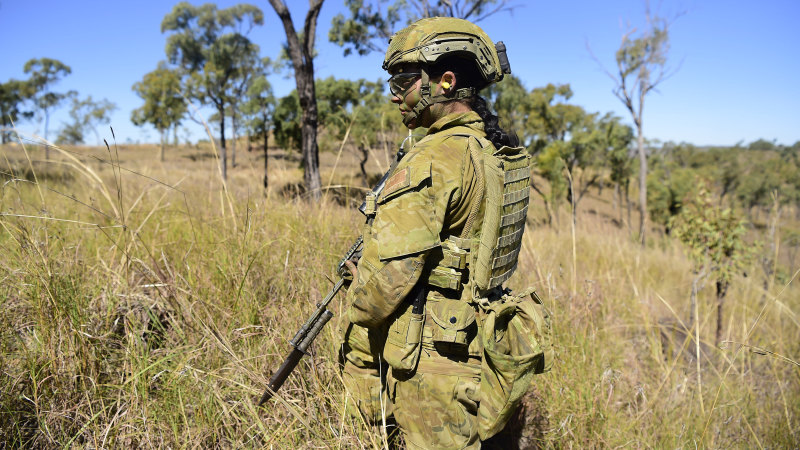Save articles for later
Add articles to your saved list and come back to them any time.
The federal opposition has blasted a major army restructure by the Albanese government, arguing that the plan to move around 800 troops to northern Australia and abolish two combat units will weaken the army’s ability to win a land war, damage morale and undermine the Defence Force’s bid to attract and retain more uniformed personnel.
While welcoming the relocation of hundreds of Defence roles to north Queensland, the mayor of Townsville warned the overhaul would strain the already stretched supply of housing in the city and called for more detail on where the relocated troops and their families would live.
Opposition defence spokesman Andrew Hastie said the changes would damage army morale. Credit: Alex Ellinghausen
Opposition defence spokesman Andrew Hastie said the relocation of army units to Darwin, Townsville and Adelaide confirmed the government was planning to “shrink and disperse” the army.
“This will make us weaker,” Hastie said of the biggest army restructure since 2011. “We need to be investing in army, our people, and combat power – instead we are shrinking our land forces to one armoured brigade.
“That means we only have one hand to play in a high-intensity conflict.”
The changes are intended to refocus the army on conducting “littoral” missions near shorelines in the Indo-Pacific rather than land wars in the Middle East, a central finding of the defence strategic review released in April.
Hastie said the disbandment of two combat units in Adelaide and the consolidation of armoured equipment in Townsville was a result of the government’s decision to slash a planned order of infantry fighting vehicles from 450 to 129.
“These cuts to Australian armour degrade our land power and weaken our ability to win the close fight,” said Hastie, who served as a troop commander with the army’s special forces before entering politics. “Only fools would rule out the use of armour in future ground wars, especially in the Indo-Pacific region. We ignore military history at our peril.”
Hastie said the relocation of hundreds of troops would hamper Defence Force recruitment by causing serious disruptions to family life, schooling and spousal employment for the affected soldiers and their families.
The Defence Force revealed earlier this year that around 6600 personnel were leaving each year, hampering its ability to meet the ambitious goal of expanding uniformed personnel by 18,500 by 2040. It has previously struggled to convince military personnel to live in cities such as Darwin rather than Adelaide.
Speaking alongside Defence Minister Richard Marles in Townsville, acting army chief Major-General Richard Vagg said the changes “will result in world-class, relevant and well-resourced units and formations”.
“The organisation will allow us to train as we would fight and position our equipment where it’s most needed,” he said.
Marles described the overhaul as an important step forward for the nation’s army but said there were obvious challenges, including the need for more Defence housing in Queensland.
“It is a challenge, but we do have time,” he said, stressing that the restructure would take up to six years to come into full effect. “This is not happening immediately.”
Army personnel will be shifted from southern to northern Australia in the biggest overhaul since 2011.
Australian Defence Association executive director Neil James said: “The army should not have been put in this position, largely so Defence and the government can move funding elsewhere rather than increase the Defence budget overall to meet the changed strategic situation.”
Townsville Mayor Jenny Hill said the consolidation of tanks, combat reconnaissance vehicles, infantry fighting vehicles and army helicopters in Townsville would make it the nation’s “centre of military, particularly for the army”.
“We welcome this expansion but the federal government needs to also tell us how we are going to deal with our housing issues,” Hill told ABC radio.
The rental vacancy rate in Townsville was 0.6 per cent in August, according to Domain.
Retired major-general Fergus McLachlan, who served as head of the army’s largest command, said the changes were sensible overall but warned the movement of troops from Adelaide “will set the army backwards at a very challenging time for Defence to recruit”.
Cut through the noise of federal politics with news, views and expert analysis. Subscribers can sign up to our weekly Inside Politics newsletter.
Most Viewed in Politics
From our partners
Source: Read Full Article



